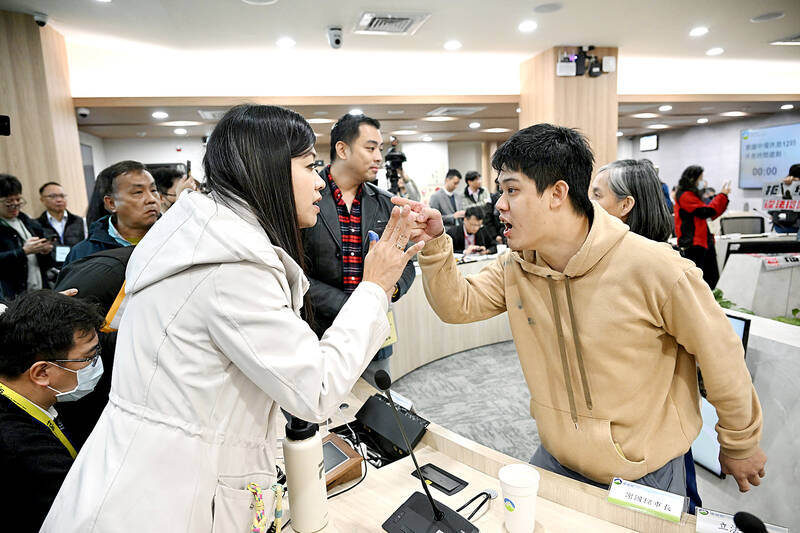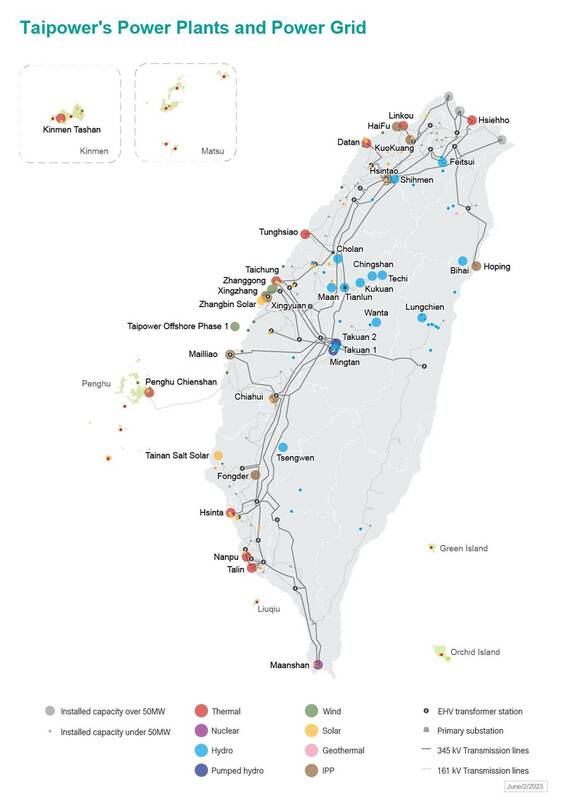A physical altercation broke out yesterday at a meeting to assess the environmental impact of Taiwan Power Co’s (Taipower) plan to renovate the Concord Power Plant in Keelung, which includes building a fourth liquefied natural gas (LNG) terminal, as fierce opposition to the proposal continues.
The Environmental Impact Assessment (EIA) Committee approved the report, but said that developers should include soil and groundwater statistics in the report, and urged them to increase the number of locations, items and frequency of soil and groundwater tests.
Developers should also correctly identify coral by genus and use high-porosity materials in the designated development area, it said.

Photo: Lo Pei-de,Taipei Times
After Taiwan People’s Party legislators raised concerns over the meeting’s procedure and the completeness of Taipower’s assessment, the discussions escalated into a physical altercation, with people opposing the plan forcefully occupying the speaker’s podium, temporarily suspending the meeting.
Deputy Minister of Environment Yeh Jiunn-horng (葉俊宏), who chaired the meeting, announced a recess before continuing at 12:17pm.
However, the conflict continued after the meeting reconvened, leaving Taipower representatives to complete their report amid the chaos.

Photo grab from Taiwan Power Co.
The company said that the areas of Taipei, New Taipei City, Taoyuan, Keelung and Yilan County primarily rely on power grids to the northeast and northwest, but increasing populations and industrial development in Keelung, Yilan County, and urban districts east of Taipei’s Zhongshan (中山) and Datong (大同) districts, and east of New Taipei City’s Banciao District (板橋) have placed significant pressure on the northeastern grid.
Last month, Taipower chairman Tseng Wen-sheng (曾文生) warned of possible insufficient power capacity for the northeastern grid, saying that the grid was already relying on outside power due to the retirement of power generation units in northern Taiwan.
Power generation for the northeastern grid previously relied on the Guosheng Nuclear Power Plant in New Taipei City’s Wanli District (萬里), which was decommissioned in 2023, the Concord facility and the privately operated Ho-Ping Power Plant, with excess need pulled from the northwestern grid, he said.
The Concord plant only operates two oil-fired power generation units, reducing the northeastern power grid to 1.5 power plants, Taipower said, adding that both units have not been generating power at full capacity to reduce air pollution.
Taipower said the northeastern grid would have to generate 6 gigawatts (GW) this year to comply with government policies to power companies in the artificial intelligence supply chain and accommodate an increased population.
However, with more power generation units due to be decommissioned — the Concord’s third and fourth units were initially scheduled for decommissioning at the end of last year — the Ho-Ping plant, and its 1.3GW of capacity, would have to shoulder the brunt of power generation, leaving a 4.7GW shortfall, it said.
That exceeds the minimum of the 4.2GW required for a reliable power grid, it said.
Taipower said it is implementing floating storage regasification units (FSRU) to temporarily provide sufficient LNG so that new gas-fired power unit could begin commercial operations as early as 2031.
Temporary FSRUs would not provide sufficient LNG for a safety buffer, the company said.
Only the completion of the fourth LNG terminal, slated for 2037, could provide that capacity, it said.
The new gas-fired power generation units should be able to provide 1,800GW-hours of power annually, and reduce air polluting emissions by 96 percent and greenhouse gases by 52 percent, Taipower said.

Taiwan is stepping up plans to create self-sufficient supply chains for combat drones and increase foreign orders from the US to counter China’s numerical superiority, a defense official said on Saturday. Commenting on condition of anonymity, the official said the nation’s armed forces are in agreement with US Admiral Samuel Paparo’s assessment that Taiwan’s military must be prepared to turn the nation’s waters into a “hellscape” for the Chinese People’s Liberation Army (PLA). Paparo, the commander of the US Indo-Pacific Command, reiterated the concept during a Congressional hearing in Washington on Wednesday. He first coined the term in a security conference last

Prosecutors today declined to say who was questioned regarding alleged forgery on petitions to recall Democratic Progressive Party (DPP) legislators, after Chinese-language media earlier reported that members of the Chinese Nationalist Party (KMT) Youth League were brought in for questioning. The Ministry of Justice Investigation Bureau confirmed that two people had been questioned, but did not disclose any further information about the ongoing investigation. KMT Youth League members Lee Hsiao-liang (李孝亮) and Liu Szu-yin (劉思吟) — who are leading the effort to recall DPP caucus chief executive Rosalia Wu (吳思瑤) and Legislator Wu Pei-yi (吳沛憶) — both posted on Facebook saying: “I

The Ministry of Economic Affairs has fined Taobao NT$1.2 million (US$36,912) for advertisements that exceed its approved business scope, requiring the Chinese e-commerce platform to make corrections in the first half of this year or its license may be revoked. Lawmakers have called for stricter enforcement of Chinese e-commerce platforms and measures to prevent China from laundering its goods through Taiwan in response to US President Donald Trump’s heavy tariffs on China. The Legislative Yuan’s Finance Committee met today to discuss policies to prevent China from dumping goods in Taiwan, inviting government agencies to report. Democratic Progressive Party Legislator Kuo Kuo-wen (郭國文) said

The Ministry of Economic Affairs has fined Taobao NT$1.2 million (US$36,900) for advertisements that exceeded its approved business scope and ordered the Chinese e-commerce platform to make corrections in the first half of this year or its license would be revoked. Lawmakers have called for stricter supervision of Chinese e-commerce platforms and more stringent measures to prevent China from laundering its goods through Taiwan as US President Donald Trump’s administration cracks down on origin laundering. The legislature’s Finance Committee yesterday met to discuss policies to prevent China from dumping goods in Taiwan, inviting government agencies to report on the matter. Democratic Progressive Party